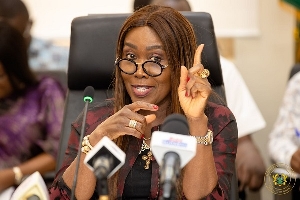- Home - News
- TWI News | TV
- Polls
- Year In Review
- News Archive
- Crime & Punishment
- Politics
- Regional
- Editorial
- Health
- Ghanaians Abroad
- Tabloid
- Africa
- Religion
- Election 2020
- Coronavirus
- News Videos | TV
- Photo Archives
- News Headlines
- Press Release
Opinions of Thursday, 26 March 2020
Columnist: Ransford Bekoe
Coronavirus and education in Africa: Traditional media to the rescue
The right to education is a basic human rights issue. When the World Health Organization (WHO) declared the viral Coronavirus disease (COVID-19) as a global pandemic on 11th March 2020, the world body urged governments all over the world to take aggressive action to stop the spread of the virus.
In response, according to an article by ‘Save the Children’, as Governments are acting to ensure that millions of pupils and students do not lose out to contain the COVID-19 outbreak, more than 120 countries have already introduced nation-wide closures affecting nearly three-quarters of the world’s student population – an estimated 1.2 billion learners – according to UNESCO. This number is expected to rise as the Coronavirus looks set to spread further .
With the closure of schools as a result of COVID, UNESCO has offered countries globally take part in its online learning platforms through social media and other broadcasts so education can continue. Higher educational institutions are particularly encouraged to access resources from Open Universities.
However, the challenge in Africa is that its educational system is the most affected. Already, UNESCO notes that in Africa, about 38 million children in sub-Saharan Africa alone do not attend school. Indeed, Worse still, more than two-thirds of them have never even been enrolled.
For those at the primary levels of education, many from poor and deprived homes lose out on the daily free meals which are supplementary to their nutritional requirements and one of the major incentives to stay in school.
The remedy of using online resources to engage the population in school will further widen the gap between the affluent and the low-income households as internet access, the cost of bandwidth where access is granted, and erratic power supplies render such initiatives a non-starter.
With a population of 1.3 trillion, Africa’s internet penetration is only 39.3 %, which means that almost two-thirds of the continent’s population are without access to the internet , further worsening the plight of the underprivileged students.
Reorienting the programmes of the traditional information media (radio and television) is a trump card to ensuring equity in educational delivery during these perilous times.
National governments should, as a matter of urgency, roll out programmes on national radios and televisions (with their coverages) to meet all categories of learners (nursery to tertiary education) while the world holds on to the hope of a remedy in the shortest possible time.
Television networks that focus on education, such as AAU TV, whose niche is on streaming higher education content in Africa, is already rendering this service to the continent and should j be incentivized.
Ransford Bekoe
(Director of Programmes, AAU TV)
Association of African Universities
Accra, Ghana











